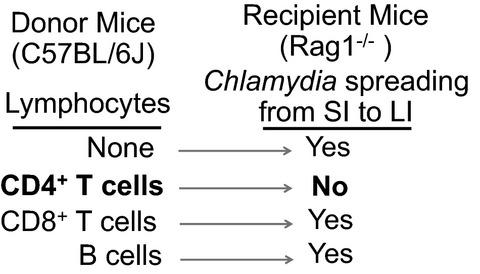当前位置:
X-MOL 学术
›
Immunol. Cell Biol.
›
论文详情
Our official English website, www.x-mol.net, welcomes your
feedback! (Note: you will need to create a separate account there.)
Regulation of Chlamydia spreading from the small intestine to the large intestine via an immunological barrier
Immunology and Cell Biology ( IF 3.2 ) Pub Date : 2021-02-10 , DOI: 10.1111/imcb.12446 Conghui He 1, 2 , Ying Xu 1, 3 , Zhi Huo 1, 3 , Jie Wang 3 , Tianjun Jia 2 , Xiao-Dong Li 1 , Guangming Zhong 1
Immunology and Cell Biology ( IF 3.2 ) Pub Date : 2021-02-10 , DOI: 10.1111/imcb.12446 Conghui He 1, 2 , Ying Xu 1, 3 , Zhi Huo 1, 3 , Jie Wang 3 , Tianjun Jia 2 , Xiao-Dong Li 1 , Guangming Zhong 1
Affiliation

|
The obligate intracellular bacterium Chlamydia is a genital tract pathogen that can also colonize the gastrointestinal tract for long periods. The long-lasting colonization is dependent on chlamydial spreading from the small intestine to the large intestine. We previously reported that a mutant Chlamydia was able to activate an intestinal barrier for blocking its own spreading to the large intestine. In the current study, we used the mutant Chlamydia colonization model to confirm the intestinal barrier function and further to determine the immunological basis of the barrier with gene-deficient mice. Recombination activating gene 1−/− mice failed to block the mutant Chlamydia spreading, while mice deficient in toll-like receptors, myeloid differentiation primary response 88 or stimulator of interferon genes still blocked the spreading, suggesting that the intestinal barrier function is dependent on lymphocytes that express antigen receptors. Mice deficient in CD4, but not CD8 nor μ chain failed to prevent the chlamydial spreading, indicating a protective role of CD4+ cells in the intestinal barrier. Consistently, adoptive transfer of CD4+ T cells reconstituted the intestinal barrier in CD4-/- mice. More importantly, CD4+ but not CD8+ T cells nor B cells restored the intestinal barrier function in recombination activating gene 1−/− mice. Thus, CD4+ T cells are necessary and sufficient for maintaining the intestinal barrier function, indicating that the spread of an intracellular bacterium from the small intestine to the large intestine is regulated by an immunological barrier. This study has also laid a foundation for further illuminating the mechanisms by which a CD4+ T cell-dependent intestinal barrier regulates bacterial spreading in the gut.
中文翻译:

通过免疫屏障调节衣原体从小肠传播到大肠
专性细胞内细菌衣原体是一种生殖道病原体,它也可以长期定植胃肠道。持久的定植取决于衣原体从小肠到大肠的扩散。我们之前报道过,一种突变的衣原体能够激活肠道屏障以阻止其自身扩散到大肠。在目前的研究中,我们使用突变衣原体定植模型来确认肠道屏障功能,并进一步确定基因缺陷小鼠屏障的免疫学基础。重组激活基因 1 -/-小鼠未能阻断突变衣原体扩散,虽然小鼠缺乏 toll 样受体,骨髓分化初级反应 88 或干扰素基因刺激物仍然阻止扩散,这表明肠道屏障功能依赖于表达抗原受体的淋巴细胞。缺乏 CD4 而不是 CD8 和 μ 链的小鼠未能阻止衣原体扩散,表明 CD4 +细胞在肠屏障中的保护作用。一致地,CD4 + T 细胞的过继转移重建了 CD4 -/-小鼠的肠道屏障。更重要的是,在重组激活基因 1 -/-小鼠中,CD4 +但不是 CD8 + T 细胞和 B 细胞恢复了肠道屏障功能。因此,CD4+ T 细胞是维持肠道屏障功能所必需且足够的,这表明细胞内细菌从小肠到大肠的传播受到免疫屏障的调节。该研究还为进一步阐明CD4 + T细胞依赖性肠道屏障调节肠道细菌扩散的机制奠定了基础。
更新日期:2021-02-10
中文翻译:

通过免疫屏障调节衣原体从小肠传播到大肠
专性细胞内细菌衣原体是一种生殖道病原体,它也可以长期定植胃肠道。持久的定植取决于衣原体从小肠到大肠的扩散。我们之前报道过,一种突变的衣原体能够激活肠道屏障以阻止其自身扩散到大肠。在目前的研究中,我们使用突变衣原体定植模型来确认肠道屏障功能,并进一步确定基因缺陷小鼠屏障的免疫学基础。重组激活基因 1 -/-小鼠未能阻断突变衣原体扩散,虽然小鼠缺乏 toll 样受体,骨髓分化初级反应 88 或干扰素基因刺激物仍然阻止扩散,这表明肠道屏障功能依赖于表达抗原受体的淋巴细胞。缺乏 CD4 而不是 CD8 和 μ 链的小鼠未能阻止衣原体扩散,表明 CD4 +细胞在肠屏障中的保护作用。一致地,CD4 + T 细胞的过继转移重建了 CD4 -/-小鼠的肠道屏障。更重要的是,在重组激活基因 1 -/-小鼠中,CD4 +但不是 CD8 + T 细胞和 B 细胞恢复了肠道屏障功能。因此,CD4+ T 细胞是维持肠道屏障功能所必需且足够的,这表明细胞内细菌从小肠到大肠的传播受到免疫屏障的调节。该研究还为进一步阐明CD4 + T细胞依赖性肠道屏障调节肠道细菌扩散的机制奠定了基础。










































 京公网安备 11010802027423号
京公网安备 11010802027423号